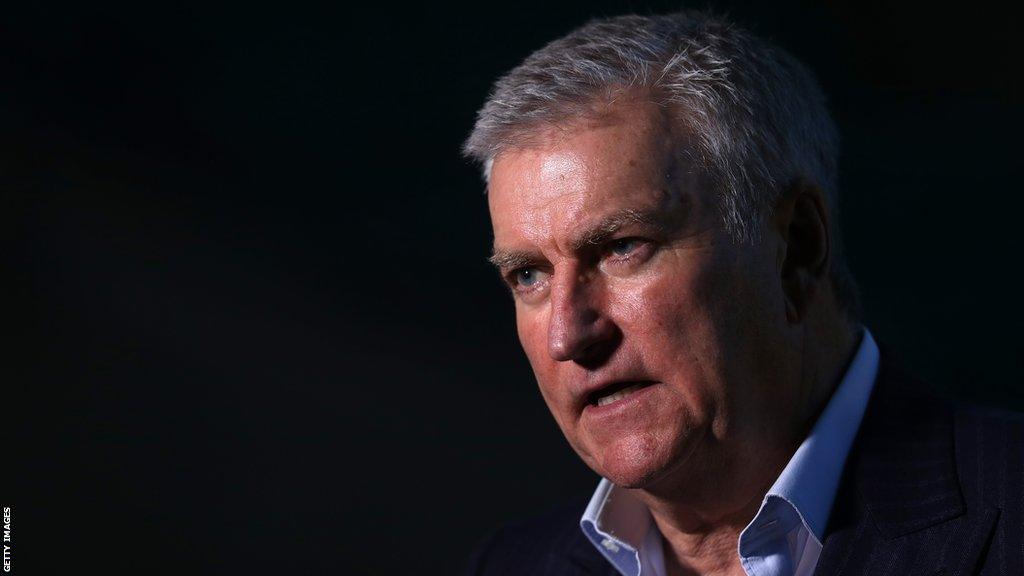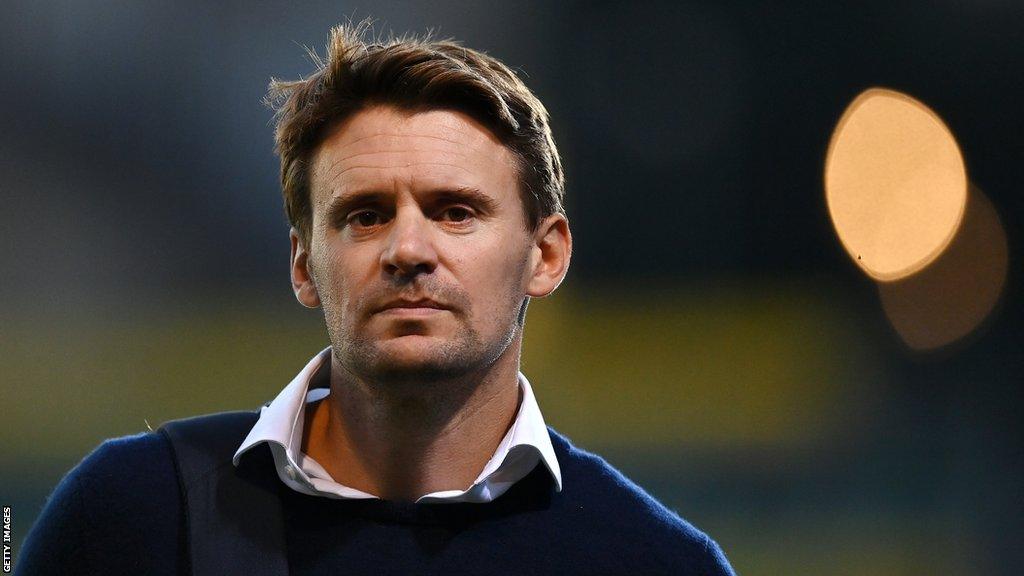Bill Sweeney: Rugby Football Union chief executive says club owners will face remodelled suitability test
- Published

Bill Sweeney was appointed chief executive of the Rugby Football Union in May 2019
Chief executive of the Rugby Football Union Bill Sweeney says any prospective owners will face new "ongoing reviews" into their suitability to run clubs.
Sweeney told a Digital, Culture, Media and Sport select committee the current owners test was "not sufficient."
But he rejected the suggestion that the RFU had been "asleep on the job" over the crises at Wasps and Worcester.
The sport's governing bodies were questioned at a parliamentary inquiry following the demise of both clubs.
The RFU and Premiership Rugby faced scrutiny from MPs over their handling of the financial meltdown that engulfed the clubs and led to their administration.
Chair of the committee, Julian Knight MP, called the loss of two sides from the top flight "a failure of the game on an epic scale".
Premiership co-founders Wasps went into administration on 17 October, with debts of more than £100m.
Worcester Warriors called in insolvency experts 13 days earlier when the arm of the club that paid players and staff was wound up in the High Court.
The club's debts have since been revealed to total more than £30m, including millions in unpaid tax.
Sweeney said the owners test that allowed Warriors owners Jason Whittingham and Colin Goldring to take over the Sixways club was not robust enough.
"They went through a fit and proper persons test in 2018 - that involved a series of background checks into their suitability to be owners and formation of business plans," he said.
"They passed, though their performance has not lived up to their ability to pass those tests."
Asked why the RFU had not acted earlier to look into the running of the club, Sweeney said the true scale of the issue at Worcester "wasn't obvious at the time".
Sweeney confirmed to the committee that there were no previous regular discussions at the RFU over the ongoing performances of owners.
"One of the learnings we have taken from this very sorry episode is a binary, once-off, owners and directors test is not sufficient to prevent bad behaviour and bad management," he said.
"Having ongoing, regular conditional reviews of their performance and suitability is necessary."
Knight revealed he would be writing to the Serious Fraud Office and West Mercia Police Complaints Commission to ask them to investigate following Goldring's claim that he had informed the RFU about being banned from working as a solicitor.
Goldring released a statement in July - through Morecambe FC - saying both the EFL and RFU were made aware of the tribunal against him with "all regulatory bodies" satisfied he was fit and proper to own and be a director of a sports club.
Sweeney said the RFU did know about Goldring's subsequent sanctioning and wrote to him, but their plans to investigate were "superseded" by "trying to save the club".
Wasps and Worcester to lose right to 'P share'
Following Wasps and Worcester's relegation from the Premiership, attention has focused on the club's rights to hold on to their allocation of revenue generated from the league - the so called 'P share' - worth about £2.5m per club, and about 10% of each club's income.
The inquiry heard earlier from the head of Worcester Warriors Community Foundation, Carol Hart, who said the club "will probably not survive under any ownership" without it, while Worcester MP Robin Walker said there was a "very strong moral case" for the club to retain their share.
However, when asked by the committee whether the stricken clubs would keep their 'P shares', Premiership Rugby chief executive Simon Massie-Taylor said the shares were "not a perpetual right".
He added: "When you get relegated and fail to come up after a second year, those 'P shares' can be acquired off you, so all clubs as part of their shareholder agreement sign up to pre-emption rights where if a club goes into administration, the 'P shares' can be acquired off them by the other clubs.
Massie-Taylor said Wasps and Worcester "knowingly signed up to this" and that he "didn't think that is a particularly strong message to send to the rest of our clubs that essentially you can go into administration and retain assets while getting rid of liabilities".

Simon Massie-Taylor said Worcester and Wasps would both have the option to buy back their P share in the future
France model has 'a lot of merit'
Sweeney had previously called the current model in England "broken" and reiterated his intention for "greater financial transparency and management" and improving the "alignment" between the Premiership and Championship, as well as the potential introduction of central contracts to help clubs mitigate the cost of international players' salaries.
He also underlined the RFU's keenness to adopt aspects of the way the game in governed in France, where he said the financial dealings of all the professional clubs are policed by an independent regulator - the DNACG - in a more "robust" way.
Massie-Taylor agreed saying there was "a lot of merit" in the French approach to financial governance and, although it wasn't a "cut and paste" model, an independent review would be carried out to improve "financial sustainability".
Players 'kept on periphery' of crisis
The collapse of Worcester and Wasps led to all players and staff becoming immediately redundant with 167 jobs going at Wasps alone.
That triggered a scramble for players to try to find other clubs with 21 from Warriors managing to get deals elsewhere.
But the lack of any designated financial support for players left them feeling "kept at the periphery" of the crisis, according to Judith Batchelar, the chief executive of the Rugby Players Association .
She told the hearing it had had a "massive impact" on the men and women players and there was "no safety net" with "no redundancy payments or designated benevolent fund".
"We lived with the risk of Premiership clubs not making money for so long, we forgot it was a risk," she said.
She said the RPA would like to see greater "diversity of advice" over decision-making with equal weight given to the future of the women's game not only over governance but also in areas of sports science.
Sweeney said the RFU are investing £220m into the women's game over the next decade saying it was a "major priority" to make it "the envy of the rest of the globe".
Analysis - BBC Hereford and Worcester political reporter James Pearson
When you want to buy a sports club, you have to go through some form of fit and proper persons test.
Both Colin Goldring and Jason Whittingham had to do that. But today we heard that once they become owners, there are no regular checks from the RFU.
Today Worcester's MP said Mr Goldring had been banned from working as a solicitor earlier this year and the chair of the committee, Julian Knight, said that this should now be investigated.
The BBC has tried to contact Colin Goldring this week. He hasn't commented on the hearing, but he has previously insisted that he was "cleared of allegations of dishonesty" when he was banned from working as a solicitor.